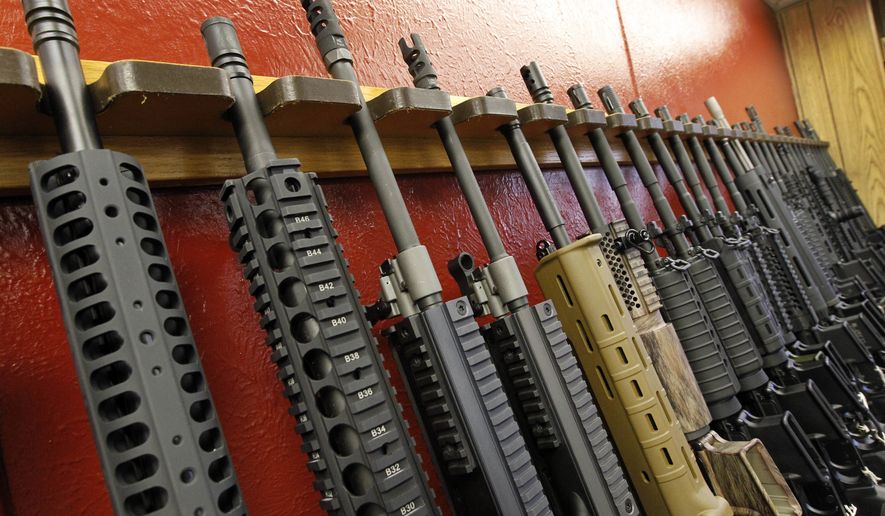JACKSONVILLE, Fla. — In the wake of the mass shooting at a Uvalde, Texas, elementary school, Congress is weighing a plan to give states incentives to adopt “red flag” laws like the one Florida enacted in 2018 that is aimed at keeping guns out of the hands of dangerous or mentally unstable individuals.
Florida’s law, enacted after the mass shooting at Marjory Stoneman Douglas High School in Parkland, has been used thousands of times in the past four years to confiscate guns from residents deemed as threats.
Florida is among 19 states that have imposed risk-based gun removal laws to curb gun-related deaths and in response to the seemingly unabated string of mass shootings at schools and other public gatherings.
The laws allow courts to temporarily suspend a person’s ability to buy or possess firearms if a judge determines there is a risk to public safety.
“There are some people who shouldn’t have a gun,” said state Rep. Randy Fine, who voted for the legislation. “There are some people who have mental health issues. And under Florida law, if you’re crazy, law enforcement can now go to a judge and ask them to look at the evidence and make the decision.”
The shooter at Stoneman Douglas High School had well-documented behavioral and mental health issues, including encounters with police, before he legally bought the AR-15-style firearm that he used to kill 17 people and injure 17 others on Feb. 14, 2018.
Mr. Fine, a Republican from Brevard County, which stretches along the Atlantic Coast east of Orlando, said law enforcement in his district support risk-based removal of firearms, and they report that the law is working to keep guns away from people who police and judges consider to be threats.
“It has prevented violence in Florida,” Mr. Fine told The Washington Times.
Gun rights groups oppose red flag laws. They argue that the laws do not afford adequate due process, are used erroneously or fallaciously, and can be dangerous.
In 2018, police fatally shot Gary J. Willis, 61, in his Ferndale, Maryland, home after he refused to put down the gun he was holding.
Police were executing the state’s newly enacted Extreme Risk Protective Order and had come to confiscate Willis’ firearms.
A day earlier, Willis’ sister went to the district court and argued to have her brother’s guns removed because he had threatened to shoot her.
Willis was not present in court and did not have an opportunity to argue.
“Gary Willis had no idea what was going to show up at his door,” said Erich Pratt, senior vice president of Gun Owners of America.
Mr. Pratt and other gun rights advocates say the red flag laws often do not give the gun owner a chance to argue against confiscation.
In many instances, risk protection orders seeking gun removal have been initiated for reasons having nothing to do with safety.
In Connecticut and Indiana, state data found that nearly one-third of confiscation orders were eventually overturned.
Mr. Pratt cited a Santa Barbara, California, man who successfully petitioned to have his wife’s Glock confiscated after she struck him in the leg and poured soda on his head after discovering text messages and nude photos from another woman on his smartphone.
“The problem with red flag laws is that you just level an accusation against somebody and there’s no due process,” Mr. Pratt said. “There’s no jury trial, your attorney doesn’t get to show up, and as a result, a lot of these are just mistaken or they are revenge.”
Red flag laws vary from state to state.
In Florida, law enforcement must file a request in civil court to seek the removal of an individual’s guns if they deem the person to be a threat. If the judge agrees, police will search the person’s home to remove all firearms.
The court must hold a hearing within two weeks to allow the person to seek the return of the weapons or to ban the person from possessing guns for a year.
“The standards are very high,” Mr. Fine said. “Law enforcement has to take it to a judge. A judge has to look at the evidence and make a decision, and then people can challenge that decision after the fact.”
Texas is not among the states that have enacted red flag laws.
The 18-year-old shooter in Uvalde legally bought the rifle used to kill at least 19 children and two adults at Robb Elementary School. He had no documented history of mental illness or run-ins with police or school officials.
Florida’s red flag law was enacted as part of a much broader school safety law that, among hundreds of provisions, raised the legal age for buying a firearm from 18 to 21 and extended the purchase waiting period to three days.
“We passed the Marjory Stoneman Douglas act over four years ago, and we have not had another mass shooting incident in Florida since,” Mr. Fine said. “Is that because of the law, or is it because we were lucky? I don’t know. But the fact of the matter is, we passed this four years ago, and we have not had another incident since.”
• Susan Ferrechio can be reached at sferrechio@washingtontimes.com.




Please read our comment policy before commenting.